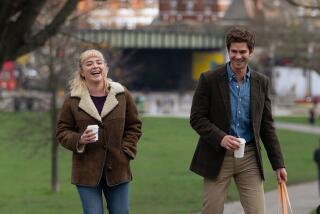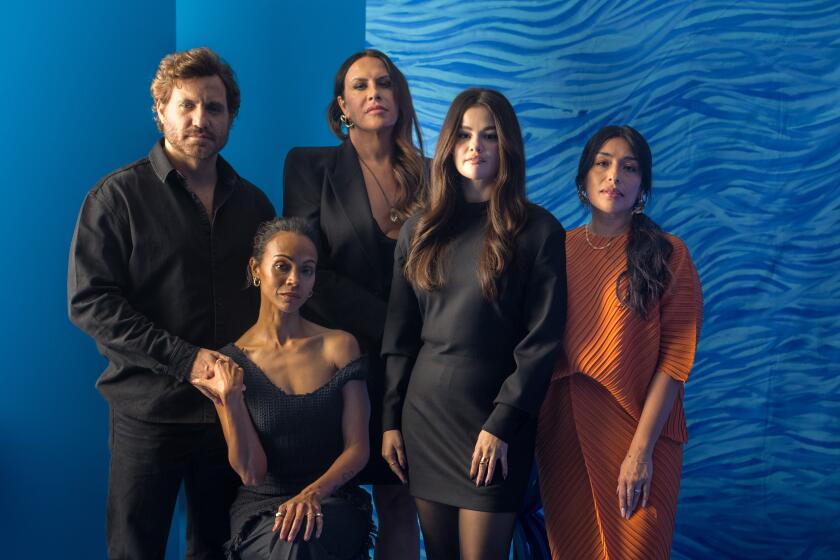On her return, she walks into controversy
During a water-skiing accident in 2007, Charlotte Gainsbourg suffered a blow to the head, resulting in a cerebral hemorrhage similar to the one that caused the tragic death of actress Natasha Richardson this year. Emergency brain surgery saved the now-38-year-old actress’ life, but it took her nearly a year to recuperate.
For her return to the big screen, Gainsbourg chose “Antichrist,” opening in Los Angeles on Friday, Danish filmmaker Lars von Trier’s staggering and surreal examination of grief, faith and sexuality. The director -- known for incendiary, female-focused works such as “Breaking the Waves,” “Dancer in the Dark” and “Dogville” -- made the film in part to rid himself of a crippling depression, creating an unusual mix of gore and allegory, visceral violence and explicit sex, tense psychodrama and outrageously hallucinatory imagery.
As spare in its storytelling as it is baroque in its emotions, the film follows a couple, played by Gainsbourg and Willem Dafoe (identified simply as “she” and “he”) as they grapple with the death of their infant son -- who fell out of a window while they were making love -- by heading to a remote cabin in the woods. Their grief eventually mutates into twisted, primal confrontations that will outdo any recent horror film for pure visceral shock, leaving audiences to wonder if they have just witnessed an expression of blunt exploitation, transgressive art, or perhaps a mixture of both.
“The thing is, I didn’t want to be cautious with this film,” said Gainsbourg, nestled on the floor of a suite at the Chateau Marmont, explaining her decision to make this film her first project after her near-death experience. “I didn’t want to be scared of [bruising] myself. I just wanted to go as far as I could. . . . I had to prove that I was able to do this.”
“Antichrist” has certainly made a mark on the international film festival circuit, causing an intense emotional reaction from audiences and critics alike. After the film’s tumultuous premiere at the Cannes Film Festival, journalists demanded that Von Trier explain and justify his movie during the press conference. Later, Gainsbourg was awarded the best actress prize by a jury that included Isabelle Huppert, Asia Argento and Robin Wright Penn. At the New York Film Festival, an audience member reportedly passed out during a screening.
Coming of the ‘Antichrist’
Gainsbourg is no stranger to controversy or the spotlight. Her parents, French singer-actor Serge Gainsbourg and British actress-singer Jane Birkin, were among the quintessential jet-set couples of the 1960s and ‘70s. While beginning her own career as an actress and singer while only a teenager, young Charlotte recorded a duet with her father titled “Lemon Incest.” Having established her acting career in France, she has appeared in the occasional cosmopolitan English-language production, including “21 Grams,” “The Science of Sleep” and “I’m Not There.” She is frequently noted in fashion magazines for her low-key glamour and recently worked on a musical collaboration with Beck (titled “IRM,” the French iteration for “MRI,” it will be released next year).
“I thought that Charlotte was a little miracle in this film,” said the notoriously mercurial Von Trier, speaking by phone from Denmark, adding that Gainsbourg came into the picture only after the actress Eva Green decided to opt out at the last minute. “I know it’s a kind of maybe a stupid thing to say, but the fact that Charlotte really wanted to do the film was very important for me. Especially when you’re down, you’re desperately looking for somebody to help you undertake this. What you want to hear is that it’s important for someone else to do.”
“I think that’s just the way I function,” Gainsbourg said of the role’s extremes, particularly in light of her own health situation and Von Trier’s precarious psyche. “I couldn’t hope for something better. After a while just thinking about your health is so boring, being so self-conscious and scared. That’s the thing: I spent a whole year being scared about having been close to death, maybe dying, so I was just wanting to work, just to do something that would be stronger than my own preoccupations.”
The film was shot by frequent Von Trier collaborator Anthony Dod Mantle (who won an Academy Award for his cinematography on “Slumdog Millionaire”), and as it becomes less grounded in reality, inhabiting more a place of heightened psychological theater, the characters begin to engage in increasingly violent ways. These acts include a much-talked-about scene of female genital mutilation.
Charges of misogynism
Perhaps not surprisingly, the film has been dogged, as have many of Von Trier’s previous films, by accusations that the director and his work are misogynistic. In an unprecedented move, the Ecumenical Jury at Cannes, which awards films for their spiritual and humanist values, created a special “anti-prize” for the film, proclaiming it “the most misogynist movie from the self-proclaimed biggest director in the world.”
“I still would claim that’s a very superficial way of looking at the film,” said Von Trier. “Anyway, if you really hate women, why do 10 films about them?”
“I understand why people could feel that way, but for me it is not part of the film,” Gainsbourg said of the charges that Von Trier hates women. “I don’t see it as being from a misogynistic point of view. On the contrary, I don’t find any hatred there. For me, the woman character was him. I felt I was playing him. The vulnerability of that woman is Lars.”
--
More to Read
Only good movies
Get the Indie Focus newsletter, Mark Olsen's weekly guide to the world of cinema.
You may occasionally receive promotional content from the Los Angeles Times.











